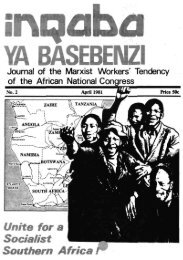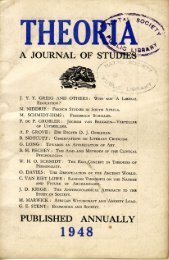Staffrider Vol.5 No.2 1982 - DISA
Staffrider Vol.5 No.2 1982 - DISA
Staffrider Vol.5 No.2 1982 - DISA
You also want an ePaper? Increase the reach of your titles
YUMPU automatically turns print PDFs into web optimized ePapers that Google loves.
some more about this wonderful law of extermination. It<br />
was about 10 a.m. when we landed on the south bank<br />
of the Vaal River — the picturesque Vaal River, upon whose<br />
banks a hundred miles farther west we spent the best and<br />
happiest days of our boyhood. It was interesting to walk on<br />
one portion of the banks of that beautiful river — a portion<br />
which we had never traversed except as an infant in mother's<br />
arms more than thirty years before. How the subsequent<br />
happy days at Barkly West, so long past, came crowding<br />
upon our memory! — days when there were no railways, no<br />
bridges, and no system of irrigation. In rainy seasons, which<br />
at that time were far more regular and certain, the river used<br />
to overflow its high banks and flood the surrounding valleys<br />
to such an extent, that no punt could carry the wagons<br />
across. Thereby the transport service used to be hung up, and<br />
numbers of wagons would congregate for weeks on both<br />
sides of the river until the floods subsided. At such times the<br />
price of fresh milk used to mount up to Is. per pint. There<br />
being next to no competition, we boys had a monopoly over<br />
the milk trade. We recalled the number of haversacks full of<br />
bottles of milk we youngsters often carried to those wagons,<br />
how we returned with empty bottles and with just that<br />
number of shillings. Mother and our elder brothers had<br />
leather bags full of gold and did not care for the 'boy's<br />
money'; and unlike the boys of the neighbouring village,<br />
having no sisters of our own, we gave away some of our<br />
money to fair cousins, and jingled the rest in our pockets. We<br />
had been told from boyhood that sweets were injurious to<br />
the teeth, and so spurning these delights we had hardly any<br />
use for money, for all we wanted to eat, drink and wear was<br />
at hand in plenty. We could then get six or eight shillings<br />
every morning from the pastime of washing that number of<br />
bottles, filling them with fresh milk and carrying them down<br />
to the wagons; there was always such an abundance of the<br />
liquid that our shepherd's hunting dog could not possibly<br />
miss what we took, for while the flocks were feeding on the<br />
luscious buds of the haak-doorns and the blossoms of the<br />
rich mimosa and other wild vegetation that abounded on the<br />
banks of the Vaal River, the cows, similarly engaged, were<br />
gathering more and more milk.<br />
The gods are cruel, and one of their, cruellest acts of<br />
omission was that of giving us no hint that in very much less<br />
than a quarter of a century all those hundreds of heads of<br />
cattle, and sheep and horses belonging to the family would<br />
vanish like a morning mist, and that we ourselves would live<br />
to pay 30s. per month for a daily supply of this same precious<br />
fluid, and in very limited quantities. They might have warned<br />
us that Englishmen would agree with Dutchmen to make it<br />
unlawful for black men to keep milk cows of their own on<br />
the banks of that river, and gradually have prepared us for<br />
the shock.<br />
Crossing the river from the Transvaal side brings one into<br />
the province of the Orange 'Free' State, in which, in the<br />
adjoining division of Boshof, we were born thirty-six years<br />
back. We remember the name of the farm, but not having<br />
been in this neighbourhood since infancy, we could not tell<br />
its whereabouts, nor could we say whether the present owner<br />
was a Dutchman, his lawyer, or a Hebrew merchant; one<br />
thing we do know, however: it is that even if we had the<br />
money and the owner was willing to sell the spot upon which<br />
we first saw the light of day and breathed the pure air of<br />
heaven, the sale would be followed with a fine of one<br />
hundred pounds. The law of the country forbids the sale of<br />
land to a native. Russia is one of the most abused countries<br />
in the world, but it is extremely doubtful if the statute book<br />
of that empire contains a law debarring the peasant from<br />
purchasing the land whereon he was born, or from building a<br />
home wherein he might end his days.<br />
At this time we felt something rising from our heels along<br />
our back, gripping us in a spasm, as we were cycling along; a<br />
needlelike pang, too, pierced our heart with a sharp thrill.<br />
\yhat was it? We remembered feeling something nearly like it<br />
when our father died eighteen years ago; but at that time our<br />
physical organs were fresh and grief was easily thrown<br />
off in tears, but then we lived in a happy South Africa that<br />
was full of pleasant anticipations, and now — what changes<br />
for the worse have we undergone! For to crown all our<br />
calamities, South Africa has by law ceased to be the home of<br />
any of her native children whose skins are dyed with a<br />
pigment that does not conform with the regulation hue.<br />
We are told to forgive our enemies and not to let the sun<br />
go down upon our wrath, so we breathe the prayer that<br />
peace may be to the white races, and that they, including our<br />
present persecutors of the Union Parliament, may never live<br />
to find themselves deprived of all occupation and property<br />
rights in their native country as is now the case with the<br />
native. History does not tell us of any other continent where<br />
the Bantu lived besides Africa, and if this systematic ill<br />
treatment of the natives by the colonists is to be the guiding<br />
principle of Europe's scramble for Africa, slavery is our only<br />
alternative; for now it is only as serfs that the natives are<br />
legally entitled to live here. Is it to be thought that God is<br />
using the South African Parliament to hound us out of our<br />
ancestral homes in order to quicken our pace heavenward?<br />
But go from where to heaven? In the beginning, we are<br />
told, God created heaven and earth, and peopled the earth,<br />
for people do not shoot up. to heaven from nowhere. They<br />
must have had an earthly home. Enoch, Melchizedek, Elijah,<br />
and other saints, came to heaven from earth. God did not say<br />
to the Israelites in their bondage: 'Cheer up, boys; bear it all<br />
in good part for I have bright mansions on high awaiting you<br />
all.' But he said: T have surely seen the affliction of my<br />
people which are in Egypt, and have heard their cry by<br />
reason of their taskmasters; for I know their sorrows, and I<br />
am come down to bring them out of the hands of the<br />
Egyptians, and to bring them up out of that land unto a good<br />
land and a large, unto a land flowing with milk and honey.'<br />
And He used Moses to carry out the promise He made to<br />
their ancestor Abraham in Canaan, that 'unto thy seed will I<br />
give this land.' It is to be hoped that in the Boer churches,<br />
entrance to which is barred against coloured people during<br />
divine service, they also read the Pentateuch.<br />
It is doubtful if we ever thought so much on a single<br />
bicycle ride as we did on this journey; however, the sight of a<br />
policeman ahead of us disturbed these meditations and gave<br />
place to thoughts of quite another kind, for — we had no pass.<br />
Dutchmen, Englishmen, Jews, Germans and other foreigners<br />
may roam the 'Free' State without permission — but not<br />
natives. To us it would mean a fine and imprisonment to be<br />
without a pass. The 'pass' law was first instituted to check the<br />
movement of livestock over sparsely populated areas. In a<br />
sense it was a wise provision, in that it served to identify the<br />
livestock which one happened to be driving along the high<br />
road, to prove the bona fides of the driver and his title to the<br />
stock. Although white men still steal large droves of horses<br />
in Basutoland and sell them in Natal or in East Griqualand,<br />
they, of course, are not required to carry any passes. These<br />
white horse-thieves, to escape the clutches of the police,<br />
employ natives to go and sell the stolen stock and write the<br />
passes for these natives, forging the names of magistrates and<br />
justices of the peace. Such native thieves in some instances<br />
ceasing to be hirelings in the criminal business, trade on their<br />
own, but it is not clear, what purpose it is intended to serve<br />
by subjecting native pedestrians to the degrading requirement<br />
of carrying passes when they are not in charge of any stock.<br />
In a few moments the policeman was before us and<br />
we alighted in presence of the representative of the law, with<br />
our feet on the accursed soil of the district in which we were<br />
born. The policeman stopped. By his looks and his familiar<br />
'Dag Jong' we noticed that the policeman was Dutch, and the<br />
STAFFRIDER, VOL. 5 NO. 2, <strong>1982</strong> 33
















